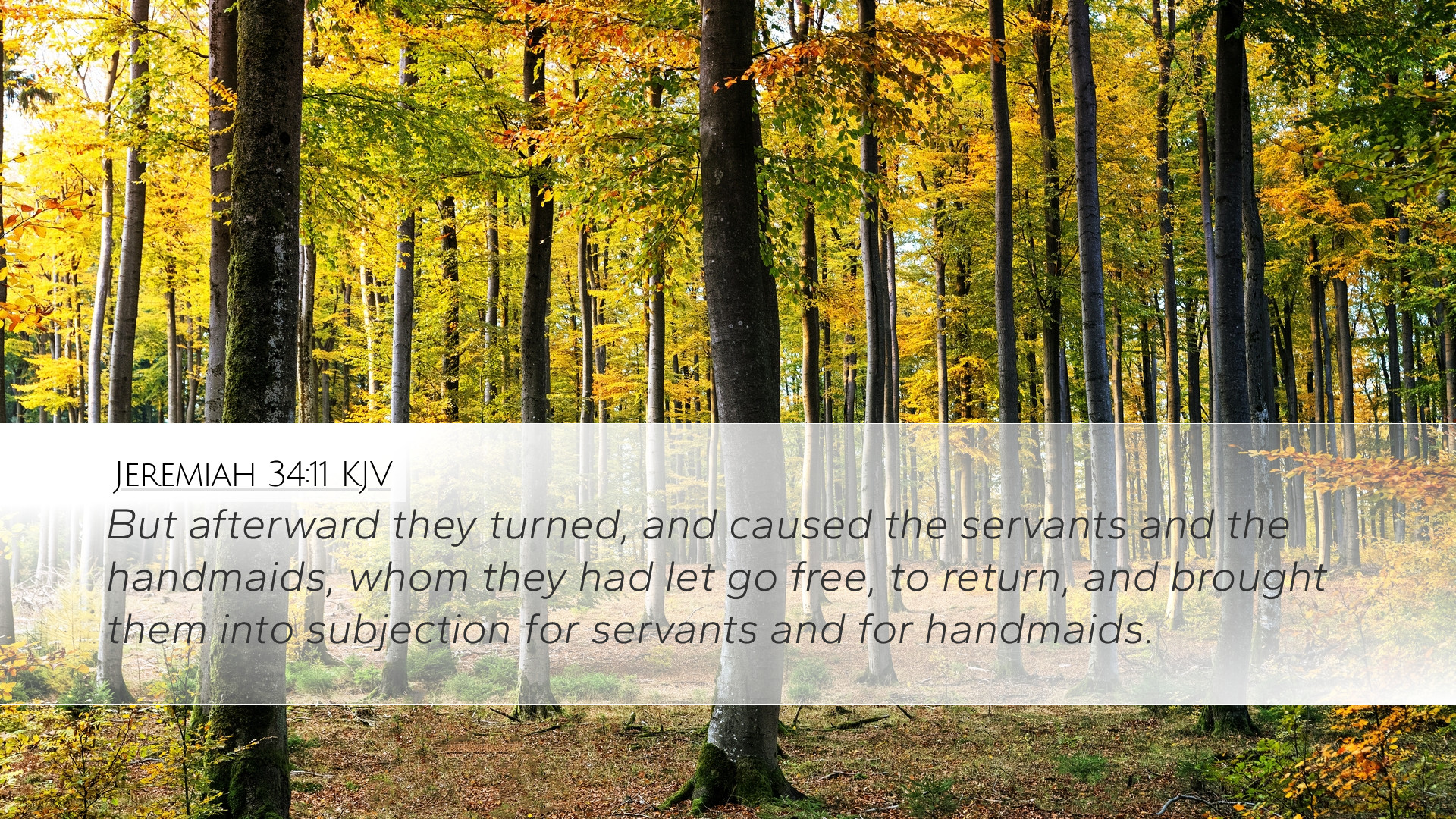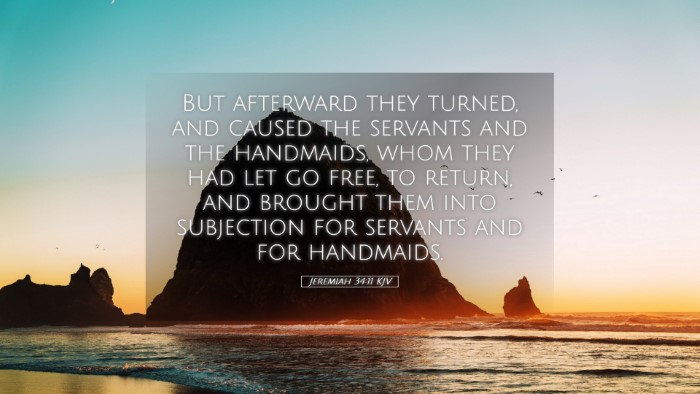Commentary on Jeremiah 34:11
Verse: Jeremiah 34:11 - "But afterward they turned, and caused the servants and the handmaids whom they had let go free to return, and brought them into subjection for servants and for handmaids."
Contextual Background
The Book of Jeremiah is set against the backdrop of the final days of the Kingdom of Judah as it faces the impending Babylonian invasion. Jeremiah, a prophet ordained by God, is tasked with conveying messages of warning, judgment, and hope. Chapter 34 specifically addresses the consequences of rebellion against God’s commandments, and the historical ramifications of the covenant made with the Hebrew slaves.
Insights from Commentators
Matthew Henry's Commentary
Matthew Henry emphasizes the irresponsibility and lack of integrity shown by the people of Judah. He notes that they initially complied with their promise to release their servants and handmaids during a time of national crisis. However, once the pressure subsided, they reverted to their oppressive practices, demonstrating a profound disregard for the moral obligations they had undertaken. Henry points out that their actions illustrate a deeper issue: an unwillingness to uphold divine justice when convenient.
Albert Barnes' Notes
Albert Barnes reflects on the significance of covenant-breaking in this passage. He highlights that the people had made a formal decree to free their servants but once assured of safety from external threats, they abandoned their commitment. Barnes interprets this as a reflection of the larger theme of disobedience among the people of Judah, which ultimately leads to their downfall. He further argues that their actions were not just against the slaves but against God, who had commanded justice and mercy.
Adam Clarke's Commentary
Adam Clarke analyses the sociopolitical implications of this verse. He notes that the release of slaves was not merely a legal matter but a moral and spiritual responsibility. Clarke suggests that the people’s decision to re-enslave those they had previously freed illustrates a collective failure to recognize the value of human dignity and divine injunctions against oppression. He underscores the notion that this act of returning to slavery was both a personal and communal sin that would have lasting repercussions for Judah.
Theological Reflections
The disobedience reflected in Jeremiah 34:11 serves as a cautionary tale for both ancient Israel and contemporary readers. It highlights the tension between divine expectation and human action. The passage serves as a reminder that faithfulness to God's commands is not merely about external compliance but also about internal commitment to justice and mercy.
The Importance of Keeping Promises
“Let your yes be yes and your no be no” (Matthew 5:37). This teaching mirrors the principle observed in Jeremiah 34:11. The act of promising to free the servants only to retract demonstrates the consequences of lacking integrity. This foundational biblical principle invites pastors and theologians to encourage congregations to prioritize integrity in both personal and communal commitments, illustrating how promises reflect both our character and our faith in God.
Justice and Mercy
The people of Judah's actions resonate with the biblical principle of justice, as established in the Law (Exodus 21). The failure to uphold justice for the oppressed leads to divine judgment, which serves as a powerful reminder for believers today to act justly and love mercy (Micah 6:8). This invitation to embrace justice should become a foundational teaching in churches, resonating with the gospel's transformative power for societal change.
Contemporary Application
As modern readers reflect on Jeremiah 34:11, several relevant themes emerge:
- Covenant Faithfulness: The call to live out the commitments we make, both to God and to one another, illustrates the ongoing need for integrity in our relationships.
- Advocacy for the Oppressed: The re-enslavement of hired hands serves as a reminder of the importance of standing against modern forms of oppression and injustice.
- Repentance and Restoration: Even in our failures, there is an opportunity for repentance and restoration. Pastors and leaders must create environments where confession and forgiveness are encouraged.
Conclusion
Jeremiah 34:11 poignantly teaches us about the implications of abandoning our commitments. The disregard for the promise made to servants reflects broader issues of ethical integrity and justice. Through these reflections, pastors, students, and theologians can draw critical insights into the divine expectations that govern human behaviors and relationships. The historical context of this passage not only informs our understanding of the ancient world but invites contemporary believers to uphold the values of justice, mercy, and faithfulness in their communities today.


